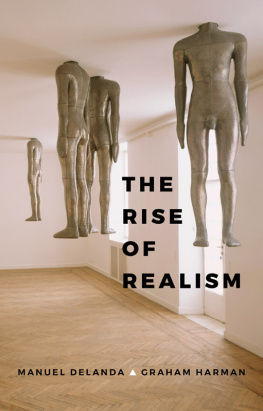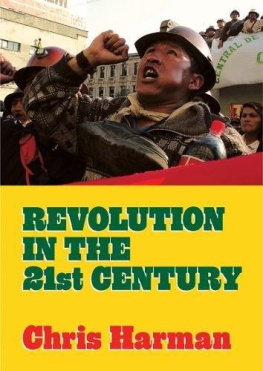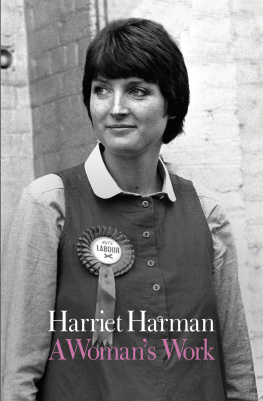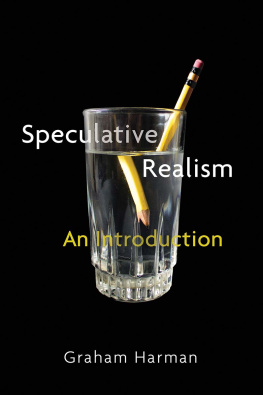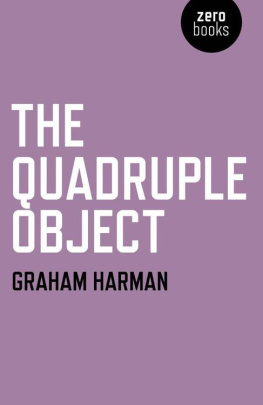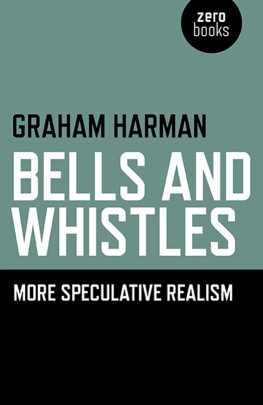Manuel DeLandaGraham Harman - The Rise of Realism
Here you can read online Manuel DeLandaGraham Harman - The Rise of Realism full text of the book (entire story) in english for free. Download pdf and epub, get meaning, cover and reviews about this ebook. City: Oxford, year: 2018;2017, publisher: Wiley;Polity Press, genre: Religion. Description of the work, (preface) as well as reviews are available. Best literature library LitArk.com created for fans of good reading and offers a wide selection of genres:
Romance novel
Science fiction
Adventure
Detective
Science
History
Home and family
Prose
Art
Politics
Computer
Non-fiction
Religion
Business
Children
Humor
Choose a favorite category and find really read worthwhile books. Enjoy immersion in the world of imagination, feel the emotions of the characters or learn something new for yourself, make an fascinating discovery.
- Book:The Rise of Realism
- Author:
- Publisher:Wiley;Polity Press
- Genre:
- Year:2018;2017
- City:Oxford
- Rating:5 / 5
- Favourites:Add to favourites
- Your mark:
- 100
- 1
- 2
- 3
- 4
- 5
The Rise of Realism: summary, description and annotation
We offer to read an annotation, description, summary or preface (depends on what the author of the book "The Rise of Realism" wrote himself). If you haven't found the necessary information about the book — write in the comments, we will try to find it.
The Rise of Realism — read online for free the complete book (whole text) full work
Below is the text of the book, divided by pages. System saving the place of the last page read, allows you to conveniently read the book "The Rise of Realism" online for free, without having to search again every time where you left off. Put a bookmark, and you can go to the page where you finished reading at any time.
Font size:
Interval:
Bookmark:


Copyright Manuel DeLanda and Graham Harman, 2017
The right of Manuel DeLanda and Graham Harman to be identified as Authors of this Work has been asserted in accordance with the UK Copyright, Designs and Patents Act 1988.
First published in 2017 by Polity Press
Polity Press
65 Bridge Street
Cambridge CB2 1UR, UK
Polity Press
350 Main Street
Malden, MA 02148, USA
All rights reserved. Except for the quotation of short passages for the purpose of criticism and review, no part of this publication may be reproduced, stored in a retrieval system or transmitted, in any form or by any means, electronic, mechanical, photocopying, recording or otherwise, without the prior permission of the publisher.
ISBN-13: 978-1-5095-1902-6
ISBN-13: 978-1-5095-1903-3(pb)
A catalogue record for this book is available from the British Library.
Library of Congress Cataloging-in-Publication Data
Names: De Landa, Manuel, author.
Title: The rise of realism / Manuel DeLanda, Graham Harman.
Description: Malden, MA : Polity, 2017. | Includes bibliographical references and index.
Identifiers: LCCN 2016043508 (print) | LCCN 2016052445 (ebook) | ISBN 9781509519026 (hardback) | ISBN 9781509519033 (pbk.) | ISBN 9781509519057 (Mobi) | ISBN 9781509519064 (Epub)
Subjects: LCSH: Realism.
Classification: LCC B835 .D4 2017 (print) | LCC B835 (ebook) | DDC 149/.2dc23
LC record available at https://lccn.loc.gov/2016043508
Typeset in 11 on 13 pt Sabon
by Toppan Best-set Premedia Limited
Printed in Great Britain by CPI Group (UK) Ltd, Croydon
The publisher has used its best endeavors to ensure that the URLs for external websites referred to in this book are correct and active at the time of going to press. However, the publisher has no responsibility for the websites and can make no guarantee that a site will remain live or that the content is or will remain appropriate.
Every effort has been made to trace all copyright holders, but if any have been inadvertently overlooked the publisher will be pleased to include any necessary credits in any subsequent reprint or edition.
For further information on Polity, visit our website: politybooks.com
Realism and Materialism
Harman: The reason for this dialogue is that we are both realist philosophers working in a subfield, continental philosophy, that has never been sympathetic to realism. In this tradition the usual procedure, following in the footsteps of Edmund Husserl and Martin Heidegger, is to treat realism as a pseudo-problem. It is said that we always already find ourselves outside in the world in the mere act of intending an object before the mind. And since the phenomenologist brackets the question of whether or not a given phenomenon really exists, then even when dealing with illusory objects we are already outside in the world. For many years I was inclined toward phenomenology myself, and thus am well aware of the various self-deceptions this otherwise admirable school employs in evading the question of how the phenomenal and the real must differ. I saw this again recently in an anti-realist article by Dan Zahavi, the phenomenology gatekeeper of my generation (Zahavi 2016).
Until quite recently, almost no philosopher who was continentally trained saw anything of value in a realist position. Indeed, in our first correspondence some years ago, you stated accurately that for decades admitting that one was a realist was equivalent to acknowledging one was a child molester (DeLanda 2007). The situation in analytic philosophy has always been different. To some extent analytic philosophy was launched explicitly by G.E. Moore and Bertrand Russell as a realist reaction against the neo-Hegelian British Idealism of F.H. Bradley and others (Soames 2014). There are also plenty of anti-realist analytic philosophers, of course, but my point is this: analytic philosophers have always taken realism seriously in a way that continental philosophers generally still do not.
Now, I know that you actually came to philosophy from computers by way of analytic philosophy, when you found yourself wanting to understand programming languages. But you eventually found your chief influence in a continental philosopher, Gilles Deleuze, and despite the precision and clarity of your writing you are better known by continentals than by analytic philosophers. My own career has been less unorthodox than yours, though still atypical. I attended two rather continental graduate programs in philosophy, and was driven to a realist position by finding in my dissertation that Heidegger only makes sense if pushed in a radically realist direction. That dissertation became my first book, Tool-Being (Harman 2002). In a remarkable coincidence, that was the same year that you published your landmark realist interpretation of Deleuze though even your fans often accept everything but your realism (DeLanda 2002). I can't remember at the moment if your previous books had also declared realism explicitly (DeLanda 1991; 2007). But at least we have a specific date, 2002, as the beginning of a prominent realist current in continental philosophy, flowing from multiple directions. By 2007, there was the Speculative Realist movement, featuring me and three colleagues, which broke apart two years later due to personal and philosophical disagreements (Brassier et al. 2007). In 2011 came the New Realism group of such authors as Maurizio Ferraris (2015) in Turin and Markus Gabriel (2015) in Bonn. I have since learned that Ferraris was on the realist bandwagon as early as 1991, which led directly to a break with his mentor Gianni Vattimo, one of the most vociferous continental anti-realists of recent decades (Vattimo 1991).
DeLanda: Let me add a few remarks to your historical capsule. I was an unapologetic realist after 1991, the year in which my book about warfare was published. The space of the battlefield, although it is decidedly a cultural space, is inhabited by metallic projectiles, shrapnel, shock waves, and fire. All those lethal objects affect human soldiers, leaving corpses and mutilated bodies behind, regardless of whether the soldiers believe the objects exist or not. And for similar reasons my book on the history of the millennium, focusing on matter and energy flows, famines and epidemics, was also unambiguously realist. To take just one example, bacteria and viruses were objectively affecting our bodies centuries before we formed any beliefs about them. On the other hand, I did not offer an argument in those books for the position that all coherent materialisms must be forms of realism. I just took for granted that if human history had been so deeply affected by the material culture of weapons and battles, of vaccines and quarantines, of matter and energy flows in industry and trade, then a belief in a mind-independent world followed logically.
Harman: That brings us to the present moment. On the one hand, we have your philosophy, which is both ardently realist and ardently materialist. Then there is my own position, which is ardently realist while rejecting materialism as a form of either upward or downward reductionism, depending on whether it takes a scientific/Marxist or social constructionist form (Harman 2010a). But there is also a third position that is sometimes confused with both your philosophy and mine, which might be described as materialism without realism. Here we find Karen Barad, a materialist who also argues that objects have no reality apart from their interactions with the mind; she bases this on Niels Bohr's Copenhagen Interpretation of quantum theory (Barad 2007). Although Barad calls her philosophy agential realism, there is nothing realist about it, since she grants reality no autonomy from the human mind, or at least not from human practices.
Next pageFont size:
Interval:
Bookmark:
Similar books «The Rise of Realism»
Look at similar books to The Rise of Realism. We have selected literature similar in name and meaning in the hope of providing readers with more options to find new, interesting, not yet read works.
Discussion, reviews of the book The Rise of Realism and just readers' own opinions. Leave your comments, write what you think about the work, its meaning or the main characters. Specify what exactly you liked and what you didn't like, and why you think so.

